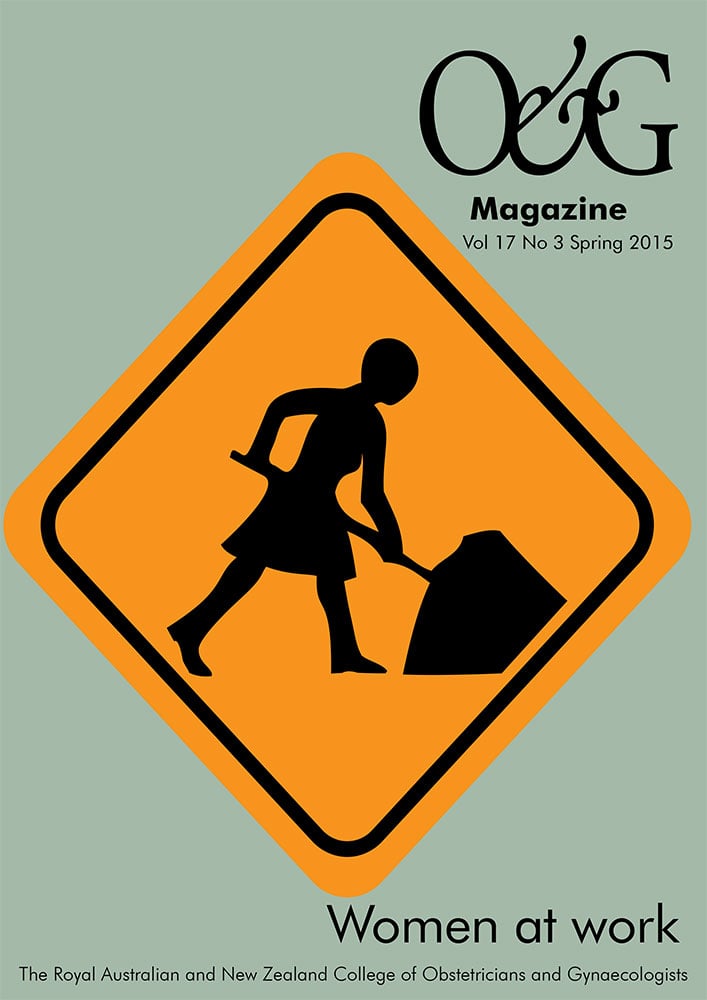The College was very pleased to welcome Ms Alana Killen as the new CEO of RANZCOG. Alana started with the College on 29 June 2015, after four years as CEO of the Australasian College for Emergency Medicine (ACEM). RANZCOG is indebted to the College staff who performed exceptionally well during the months following the departure of the previous CEO.
ANZOGSS
Prof Ian Symonds hosted the inaugural meeting of the Australian and New Zealand O&G Students’ Society (ANZOGSS) at the College in July. This is an initiative to provide increased connection between the College and those students interested in pursuing a career in our specialty. While we have no shortage of applicants to enter the FRANZCOG Training Program, it is hoped that ANZOGSS will facilitate pathways for students; fostering their interest in women’s health with a view to a long-term career in the most rewarding of all disciplines.
FIGO
RANZCOG was very pleased to be the host society for the meetings of the FIGO Executive in Melbourne in May. As part of these meetings, the College was pleased to offer delegates site visits to leading tertiary hospitals in Melbourne as well as to deliver an educational seminar on topical issues facing our specialty in this region. Following discussion at the meeting of the FIGO Executive, FIGO President, Prof Sir Sabaratnam Arulkumaran, advised the College that Sydney is the recommended venue site of the 2021 Congress. That recommendation will be considered by the full FIGO General Assembly at the 2015 FIGO Congress in Vancouver; however, we will come up against significant competition from other bidding cities in the Asia-Oceania region.
Education and Training
Procedural training numbers
Some very good work by College staff has resulted in a report of procedural numbers undertaken by our Trainees at the various training hospitals. As indicated many times previously, the College plans to place Trainees at those sites where procedural training is likely to be better and reduce Trainee numbers at the sites with lesser procedure numbers available to Trainees. Immediate and dramatic reductions in Trainee numbers at hospitals struggling to provide procedural training will cause significant staffing problems; the College will work constructively with these hospitals to assist them with staffing models that can provide an efficient clinical service with a compliment of Trainees for which they are able to provide adequate training. For example, reducing the employment of specialist international medical graduates (SIMGs) may increase procedural training availability for local Trainees.
Discrimination, bullying and sexual harassment
The Royal Australasian College of Surgeons (RACS) continues to explore strategies to reduce discrimination, bullying and sexual harassment in the workplace. RANZCOG has made a detailed submission to the RACS Expert Advisory Group on the prevention of discrimination, bullying or sexual harassment. Our College has zero tolerance for these behaviours, but recognises that effective elimination requires the employing hospitals to accept their pivotal role in the detection and investigation of inappropriate behaviour and enforcing sanctions where retraining has not been effective.
Women’s Health
FSEP and PROMPT
The Fetal Surveillance Education Program (FSEP) had been widely acclaimed for providing multi-disciplinary training in this crucial area of women’s health. On-site training in obstetric procedures is another area where the College believes it can contribute to effective multi-disciplinary training to the benefit of women and their babies. Fellows have invested considerable resources into adapting the PROMPT (PRactical Obstetric Multi-Professional Training) program for Australia and New Zealand and delivering the courses. RANZCOG is currently negotiating with the PROMPT Maternity Foundation (UK) to enable the College to continue to deliver PROMPT training courses throughout Australia and New Zealand. Regardless of the outcome, multidisciplinary onsite obstetric procedural training will remain an important area of College activity.
Rh(D) Immunoglobulin
CSL Behring recently updated the Rh(D) Immunoglobulin-VF product information with respect to women with a body mass index greater than 30. The Australian Red Cross Blood Service and the National Blood Authority convened an expert panel to make some pragmatic recommendations. The Working Party’s Position Statement and the FAQ Paper have been endorsed by the RANZCOG Board and can be accessed on the College website. Substantive changes to current practices have not been recommended.
National Cervical Screening Program
The renewed National Cervical Screening Program (NCSP; Australia) is expected to commence in 2017. It is extremely likely that the Federal Government will mandate quality assurance (QA) in colposcopy as it does for the other elements of the NCSP. Government representatives met with me and the Chair of the CPD Committee, Dr Vijay Roach, in June. RANZCOG advocated for QA programs to be as user friendly as possible and had some suggestions in this respect. The College is also strongly of the view that equity of access and continuity of provider are important elements of quality of service – alongside the more technical aspects of the procedure itself.
Medical Benefit Schedule revisions
The Federal government has flagged a major review of the Medical Benefits Schedule under the chairmanship of Prof Bruce Robinson. While government has determined that neither the Australian Medical Association nor the specialist medical colleges will be represented in the review, RANZCOG is hopeful that there will be significant representation of RANZCOG Fellows on the relevant committees to maximise the likelihood that recommendations will achieve the stated objective of improved patient care.
College Statements and Guidelines
All Trainees and Fellows are encouraged to visit the Women’s Health section of the College website where they will find the collection of statements and guidelines to be an invaluable resource. In addition to our own College statements, there are now many links to outside resources – both endorsed and other documents that are regarded as useful at a level less than endorsement.
Patient information
Some imaginative and extensive pro bono work by RANZCOG and Australian and New Zealand College of Anaesthetists Fellows has resulted in the development of quality animated videos on both caesarean section and epidural anaesthesia that are now hosted in the Women’s Health section of the College website. These are openly available at no cost. Fellows interested in promoting these videos to their patients will find links to the animated videos along with links to written patient information on the page: www.ranzcog.edu.au/womens-health/online-patient-information.htm .
Asia Pacific and Global Women’s Health
At the recent meeting in Fiji, Prof Alec Ekeroma stepped down after an outstanding term as President of the Pacific Society of Reproductive Health (PSRH). Alec’s dedication to improving women’s healthcare in the Pacific Island Countries has been truly remarkable. RANZCOG congratulates Ms Kathy Gapirongo from the Solomon Islands as the incoming PSRH President.
Selection
At the time of writing this report, the FRANZCOG training selection process for Australia is in process, with the interviews scheduled for 7 August 2015. Applications far exceed the number of available positions, with more than 250 eligible applications for approximately 80 positions. This year, approximately two-thirds of applicants will be interviewed. The College will strive to develop refinements to the selection processes to result in the best future Trainees being selected. Key to determining the best selection strategy will be feedback from hospitals on how those selected perform as Trainees. This will enable the College in the future to reflect back on those selection strategies that lead to higher selection scores from the better performing Trainees.





Leave a Reply